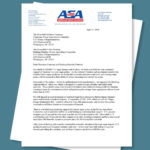Union Workers Pave The Way for Sugar Farmers
If you work on Capitol Hill, chances are good you’ve run into a sugar farmer this week. After all, there are dozens of them in town meeting with hundreds of offices.
But it’s not just farmers who are spreading the message, “Don’t cut my family out of the Farm Bill.” Union workers were in town a week earlier making the rounds.
“Meeting the different representatives and being able to talk to them and understand their point of view and explaining why you’re fighting for something is important,” said William Bland, a sugar worker from Florida and member of the International Association of Machinists and Aerospace Workers Union (IAM).
IAM is among the many organizations pushing for a strong sugar policy and fighting attempts to weaken it in the upcoming Farm Bill.
Farm policy opponents are currently lobbying to outsource U.S. sugar production and good-paying U.S. jobs to heavily subsidized foreign industries that are known to have poor environmental and labor standards.
Mark Thompson was one of the IAM Florida Sugar Workers members who made the trip to D.C. to ask lawmakers to oppose this outsourcing scheme.
“Walking the extra mile to protect our jobs is what we’re doing,” he said. “You should never be afraid to speak about something that’s important to you.”
Their trip came at an important time. Not only is Congress debating the Farm Bill, but America’s foreign competitors are busy manipulating the market in hopes of getting a leg up.
India, the world’s second biggest sugar producer, just announced a doubling of sugar import duties to protect its domestic industry, bringing the total tax to 100%. And Pakistan increased subsidies to increase exports.
All told, more than 100 countries subsidize sugar production around the world. America’s sugar policy, which costs taxpayers $0 because it is based on loans repaid with interest instead of government checks, is all U.S. producers have to counter these foreign subsidies.
IAM Florida Sugar Workers member Cornelius Fowler knows what is at stake if subsidized foreign sugar floods the market.
If there’s no sugar policy, we have “no land, no future, no job, no home,” Fowler concluded.

